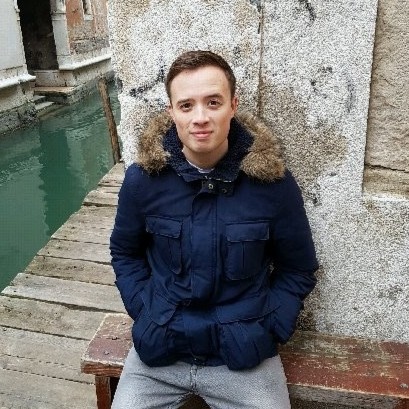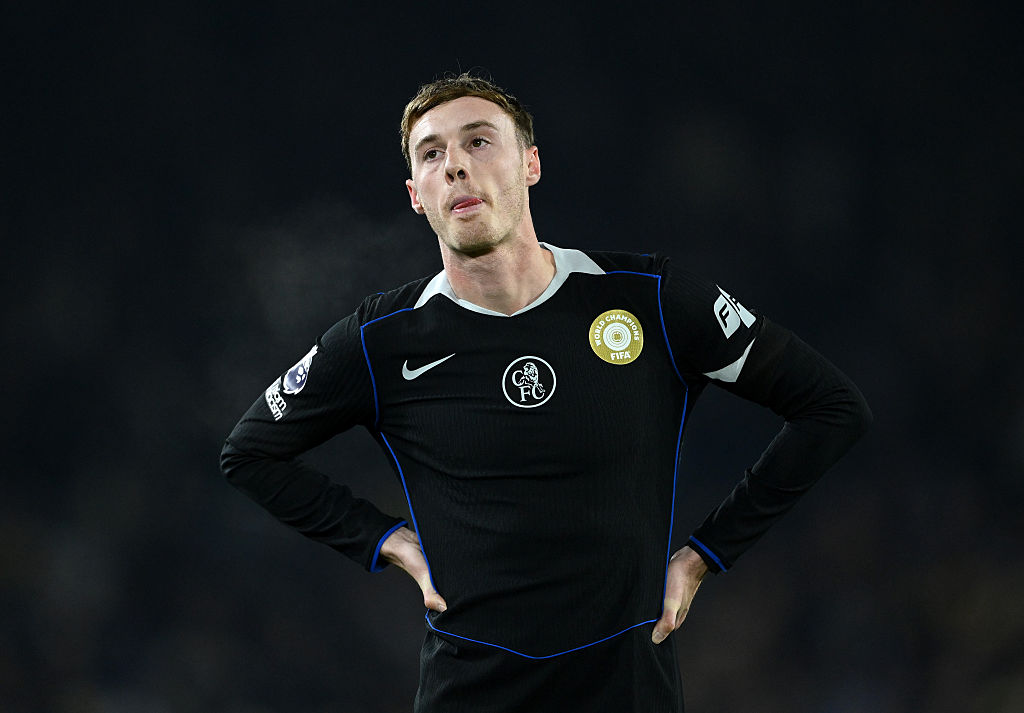Roberto Carlos to Sunday League? See also: the amazing story of Socrates at Garforth Town...
The Northern Counties East Football League side stunned English football by luring Brazilian great Socrates to West Yorkshire in 2004 – and he wasn’t the only one. FFT learns the extended story of a legendary non-league curiosity
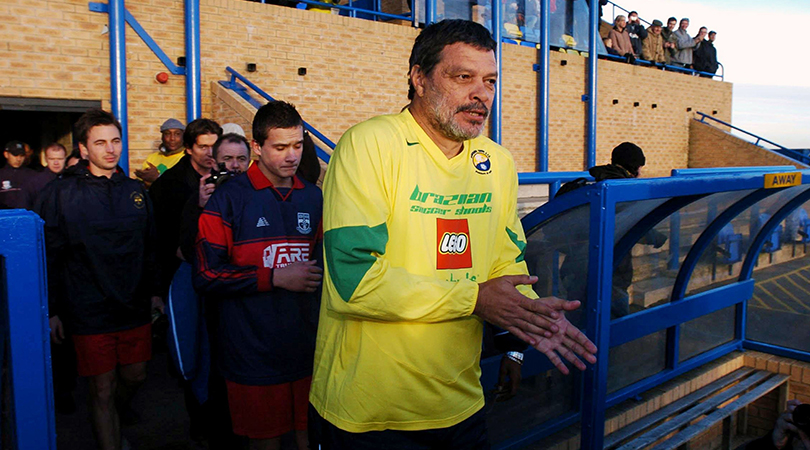
This feature originally appeared in July 2020 issue of FourFourTwo magazine. Subscribe to FourFourTwo today and save! You'll get 13 issues per year...
They say if you don’t ask, you don’t get – but often, polite enquiries take you about as far as a beached whale attempting a triathlon. Sometimes, you have to be a bit more proactive.
Or, like Simon Clifford, you befriend the father of your boyhood football team’s new Brazilian signing, learn a different language in two months, convince your wife that it’s a good idea to take out a £5,000 loan and spend your summer holiday searching for Pele, Romario and Zico in South America.
Clifford, then in his late-20s, was a humble teacher in Leeds with a longstanding passion for coaching young players. He may have been relatively inexperienced, but he was steadfast in his belief that English football was missing something significant.
“I was in love with football from my very first Middlesbrough game,” he tells FourFourTwo. “I liked creative players – my favourite at Boro was Terry Cochrane, who introduced me to the stepover. When I watched the Brazil team at the 1982 World Cup, though, I thought, ‘Wow, that is how a team should play football’. I was backing England in that tournament but I fell in love with Brazil. Every player could control the ball and had dexterity.
“When England failed to qualify for USA 94, I wasn’t very happy. I watched Graham Taylor: An Impossible Job and thought, ‘Deary me, is that the best we’ve got?’ I started to study how the Netherlands and Italy play, and had been trying to do the same with Brazil but couldn’t get hold of any proper materials.”
For years, Clifford’s boyhood enchantment had been merely that. It wasn’t until the arrival on Teesside of a pint-sized playmaker by the name of Osvaldo Giroldo Junior in October 1995 that changed everything.
The best features, fun and footballing quizzes, straight to your inbox every week.
“When Juninho joined Boro from Sao Paulo, I phoned the club to see if there was any way I could speak to him from a coaching point of view. I hit a dead end down that avenue, but his dad ended up getting given complimentary seats behind me. I couldn’t speak Portuguese back then but knew some Spanish, so I started chatting to him.”
Juninho Snr, aka Osvaldo, was charmed, and soon Clifford was spending most nights at the Brazilians’ house. He then learned Portuguese using cassettes and study books to help bring his conversations along.
“His dad encouraged our friendship,” he says. “I’d teach, take after-school training and then go over to talk football with them from 7pm to 11pm. Once, I was due at their house on the day of a Boro game. There was terrible snow, and my wife wasn’t sure that I should set off. But I did, the match got postponed, it took me about eight hours to drive up there from Leeds and I had a car crash on the way. But I carried on, and I think that persistence cemented our friendship. You could say it was a very strange day all round.”
Clifford wasn’t the only one dismayed by the English game’s stasis of the mid-90s, though.
“Juninho couldn’t believe his first experiences at training and the lack of preparation,” adds Clifford. “He asked me, ‘Is every club like this in England?’ When he told me how he’d been brought up playing futsal, I thought it sounded really interesting. He got some balls sent over which I started to use in my coaching sessions, and I felt we needed to do more of it over here.
“One day at dinner I said, ‘Osvaldo, I’d like to go to Brazil’. He told me I’d get there and find that the most amateur street corner club was more professional than any team in England with their training methods. I thought he was probably overblowing it, but needed to go and see for myself.
“I also said that I wanted to meet Pele, Zico, Careca – loads of my heroes. Osvaldo replied, ‘Simon, these guys are busy. My son plays for the Brazilian national team and even he hasn’t met some of them’.”
Clifford tried his luck faxing some embassies but hit a brick wall. So, with just a few contacts in Sao Paulo up his sleeve, he touched down in the summer of ’97 to see what he could find.
“The first days were quite grim and nothing much was happening,” continues Clifford. “But one thing led to another. I got in with a couple of people there, and the local press took to me. There was an article in [daily newspaper] Folha and the BBC came out to make a little feature. Suddenly, people wanted to help.”
And not just anyone, either: Rivelino got in touch offering assistance, as did Careca. Days later, he was watching a game alongside Zico and Romario. By the time Clifford went home, his world was a very different place.
“[England boss] Glenn Hoddle was phoning me to ask what I’d discovered over there,” he says. “He was interested in setting up a similar trip to South America to find out more, but the FA torpedoed it in the end. It sounds ridiculous these days, but the world hadn’t really opened up back then.
“I was a bit worried about leaving teaching, but also felt I could start to make a difference in football. The Brazilian government had been funding sport since the ’50s and we were way behind – I couldn’t believe what I’d seen.”
Clifford wasn’t just jet-setting to mix it with football royalty – his plan was to use futsal as the foundation for a chain of Brazilian soccer schools, which would help youngsters across the UK develop their skills where the 11-a-side game couldn’t. Toy titans Lego climbed aboard and sunk £1 million into the cause. Eventually, there were schools in more than 40 countries, on six of the seven continents. Maybe teaching wasn’t for Clifford after all.
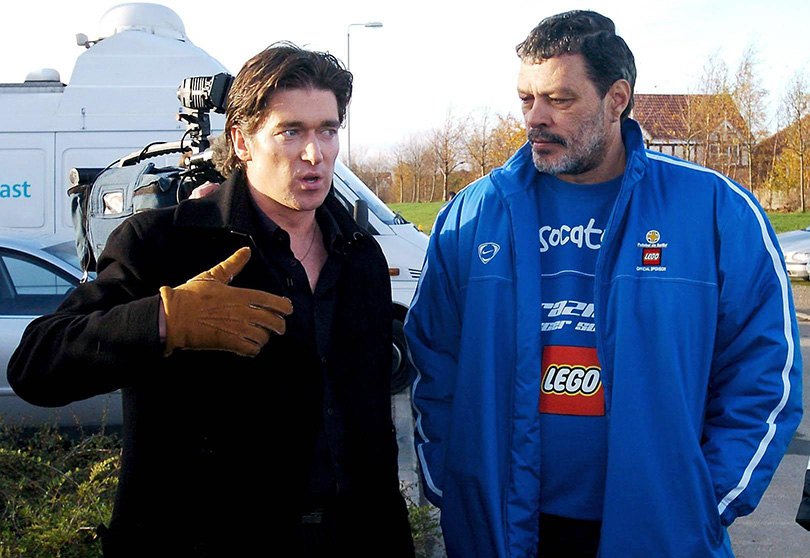
November 20, 2004. Clifford is inside Garforth Town’s dressing room, watching a rather portly 50-year-old doing star-jumps while a plume of cigarette smoke drifts lazily upwards.
But when you are Socrates, the free-spirited skipper of Brazil’s fabled 1982 World Cup side, you can warm up however you like – especially when you are about to turn out in the Northern Counties East Football League.
How both men arrived at that point requires something of a slight rewind. In 2003, Clifford had bought the 10th-tier Miners eyeing a new challenge, having enjoyed great success with his soccer schools and surprised a number of established youth teams en route.
“I rejected buying a couple of clubs because they were a tad too high up in the pyramid, but Garforth seemed like a good opportunity,” he tells FFT. “I bit off more than I could chew, but I was young and ambitious.”
Although his original plan was to stay in the background and use Garforth to help promote his schools, Clifford took the managerial reins two matches into the 2004-05 campaign after Jimmy Martin resigned. Soon, he had snared former Manchester United, Leeds and England midfielder Lee Sharpe.
“Bravo TV had the rights to broadcast Brazil games, and I was always a studio guest with James Richardson,” recalls Clifford. “Sharpey was in one week and we had a drink after. We got talking about Garforth, and I could see he was interested in coming.
“We got into a bit of a rhythm, won a couple of games and started advancing up the table. I realised that I was going to be wedded to this team for a while, so just changed my strategy to focus on Garforth. How could I make them more Brazilian to help the soccer schools, too? I pondered the idea of trying to bring Zico and Careca over to play for us.”
As former Yorkshire Evening Post writer Paul Robinson explains, “Garforth went from being a team you’d cover in a non-league round-up to one who’d offer a steady stream of stories. Some of the people in that league were a little irritated by that.”
Brett Renshaw, Garforth’s captain during that era, goes further. “We were hated everywhere we went,” he tells FFT. “Everyone knew about us and wanted us to fail. It made it harder for us on the pitch at times, but Simon took most of the heat. Everyone just abused him instead!”
According to another former player, Clifford’s antagonism towards the opposition extended to deliberately arriving late, blasting out music mid-match, regularly changing players’ squad numbers and painting the away dressing room pink at their Wheatley Park ground.
“He’d do anything to get under people’s skin and win games,” laughs Renshaw. “One time, we were up against a pretty good forward who Simon found out was a milkman – so Garforth fans were soon telling him to drop stuff off for them in the morning; whatever they could do to put him off.”
To Clifford, it was merely an extension of the battle he faced trying to get futsal recognised by the FA and other footballing powers.
“I’d already had a seven-year struggle where no one wanted to know,” he reveals. “Howard Wilkinson was the FA’s technical director at the time and wasn’t supportive of it at all. So when it came to other sides not really liking us, it was just the norm.”
But Clifford’s mischief was not overshadowed by his aspiration – and YEP reporter Robinson was never more grateful for Town’s newfound ambition than when their owner-boss tipped him off about the impending arrival of Socrates to West Yorkshire. Clifford had also befriended journalist Alex Bellos, who tapped up the Brazil icon to gauge his interest.
“He came back straight away and said that he wanted to do it,” smiles Clifford. “Originally, I think we were going to do a month of games, but we were nearly at the top of the league by the time he flew over.”
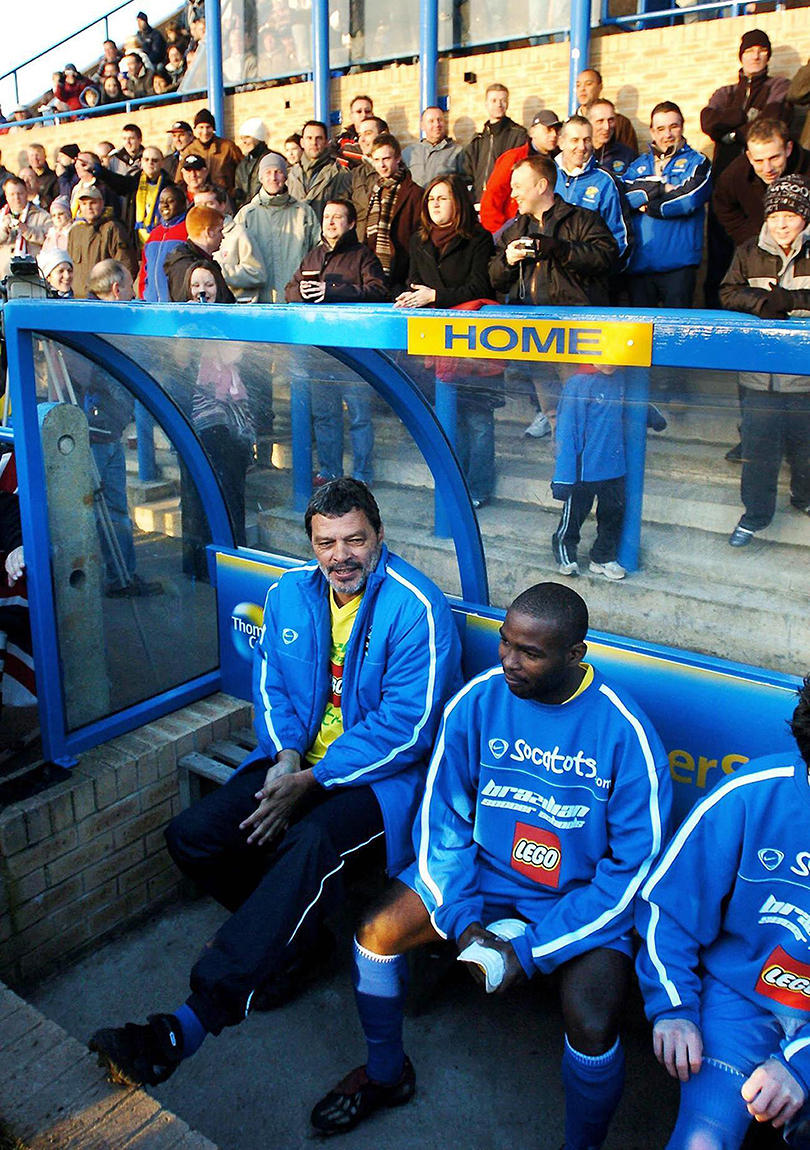
So, on a freezing November Friday evening, the 60-cap Selecao legend landed at Manchester Airport to make his footballing return – a mere 15 years after the attacking midfielder thought he had played his last game for Botafogo in 1989.
Clifford had not even needed to pay Socrates to show up for the 10-day excurison; it was an expenses-only gig, and the chain-smoking idol was still keen to get some boots on for the big occasion. It’s not like he wasn’t busy at home: the 50-year-old qualified doctor was penning both a play and thesis on why football should be nine-a-side.
It wasn’t just Garforth that went gaga for his arrival, either: the club had fielded media and shirt requests from Peru to Japan, and his new team-mates were roped in to join the fun.
“The night before the game, I got calls from several journalists asking if I’d meet them at 9am the following morning – bearing in mind we kicked off at 3pm,” recalls skipper Renshaw. “There were loads of news vans there, and I was moved from one to the next doing interviews with them all. They were asking things like, ‘Socrates was the captain of the greatest team not to win the World Cup – now you’ll be leading him. How do you feel about that?’ I hadn’t given it a thought.”
Special T-shirts were flogged for £5 a pop, as a press scrum awaited the Brazilian’s arrival to Wheatley Park. Garforth’s average attendance hovered above 200 in the former pit town, but a wave of interest meant 1,350 fans turned up to see Clifford’s prized catch face Tadcaster Albion.
“The players were in the dressing room before kick-off, talking about what might happen,” says Renshaw. “Then all of a sudden, Simon walked in with Socrates, coughing and spluttering. We were all thinking, ‘Has he just fired down a few fags?’ He looked totally unfit. I just remember thinking, ‘This guy’s not going to be playing football today’.
“But he was absolutely amazing – smiling all the time, chatting to us, laughing and joking. The sponsors had given him a pair of boots to wear, but they were the wrong size so he had to use the physio’s instead. He made everyone feel happy to be around him from the second he turned up.”
The game itself was significant for Garforth – after a slow start to the season, victory over the Brewers could have sent them top of the table. So, donning some new XXL shirts made especially for the match, they kicked off with an increasingly-cold Socrates watching on the bench – albeit without Sharpe, who was away in Thailand for a reality show about detoxing celebrities. At half-time things were going to plan, as Andy Rowan and Nick Manousios had handed Garforth a 2-0 lead. By the hour mark, however, it was 2-2.
“I was getting a bit stuck in my mind,” says Clifford. “People had come to see Socrates, but we needed to win. We were about to bring him on, but he wanted to do a bit of a warm-up – a cigarette, basically.”
The hosts were then awarded a penalty, but Socrates was still off the pitch getting his fresh air. Greg Kelly missed it. And so, on 77 minutes came the announcement.
Coming off, number two Matt Higginbottom... for number six, Socrates!
“When he came on, I vividly remember this old chap turning to his mates in the stand and saying, ‘He can’t f**king run’,” smiles journalist Robinson. “He wasn’t the quickest.” As Socrates later revealed, “The second I got out on the pitch, I had a terrible headache.”
However, the Brazilian hero still managed to impress his new colleagues.
“His touch was fantastic – straight away, you could see he was a professional once,” insists Renshaw. “He didn’t run around too much, but whenever he got the ball you’d wonder, ‘How is he even doing that?’ He definitely still had it. I don’t remember much about the game itself, but it was a brilliant experience.”
At full-time of Town’s 2-2 draw, an optimistic Clifford grinned to BBC Football Focus cameras, “If we can get him fit again, we’ve got a home game next week against Pontefract Collieries.”
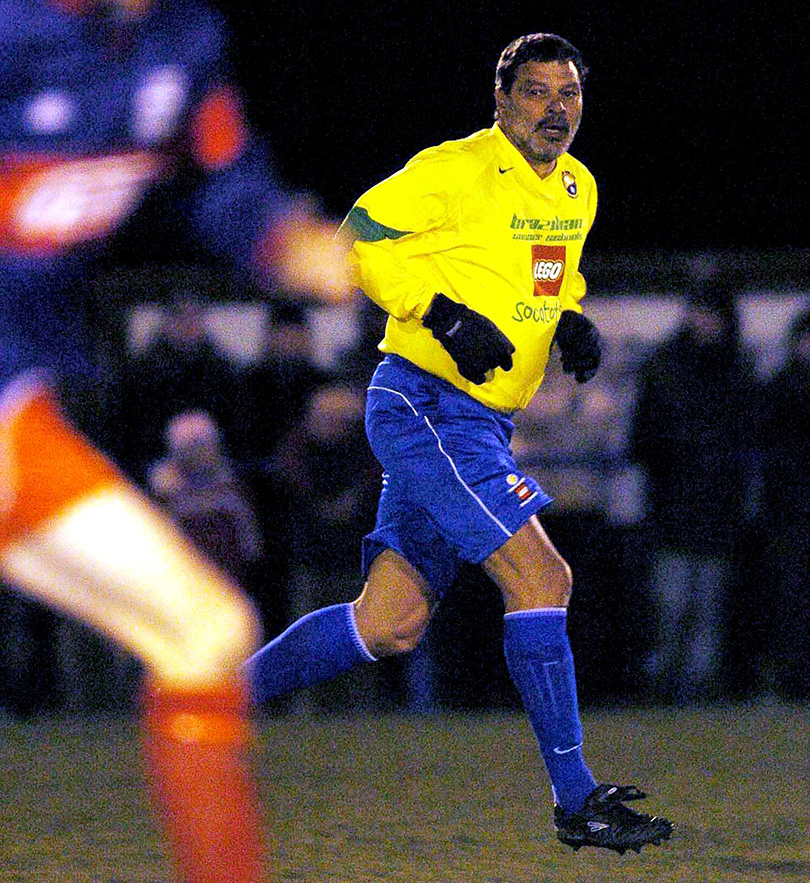
Alas, Socrates’ grand return would last for only one match. He remained on the sidelines for Garforth’s fixture against struggling Pontefract, where a crowd of 470 watched them lose 2-0.
But for Clifford, the 1982 icon’s presence had been a massive success – and he wouldn’t be the last to visit Wheatley Park.
“I hadn’t brought him over to make a huge difference to Garforth, but I’m glad he was the one who came over first,” explains Clifford. “He really believed in what I was trying to bring to England. I was a bit anti-establishment at the time, because I felt football needed it. He was too, so we would often speak in the evenings and just talk about little projects that we could possibly do together.
“Because I’d learned Portuguese, it was left to me to keep him entertained at night. We’d talk the world in every Leeds restaurant, sitting there for hours with a few beers. He’d always offer me a cigarette and joke, ‘You’re either my brother or you’re not my brother’.
“So I eventually took a cigarette off him, and by the time he left England he’d given me a gift – a Marlboro gold, which he’d signed and said, ‘Now you’ve got a habit’. I ended up smoking for nine years because of him.”
Socrates’ visit – which also entailed visits to Manchester United’s training ground (where he had to remind Alex Ferguson of his name) and a string of soccer schools, plus his acceptance of an honorary degree from Leeds Metropolitan University – paved the way for others to follow. Carlos Alberto, who captained Brazil to 1970 World Cup glory, turned up to help (“a pleasant man, always smiling,” remembers Renshaw), while his nephew even played for Garforth in pre-season. As did ex-Selecao forward Careca, who featured in a 2005 clash against Guiseley.
“He was a few years younger than Socrates, fitter and still felt like a player – he took himself quite seriously,” recalls Clifford. But he wasn’t quite as charming as Socrates, who sadly died in December 2011 aged 57.
“Careca was pretty high-maintenance,” adds Renshaw. “He missed a sitter and then got on at everyone else for it. I actually scored in that game, and everyone ran over to celebrate with me except him!”
And there were the what-might-have-beens. Cafu – the only man to appear in three straight World Cup finals – had agreed to play (before backing out) mere months after leaving Milan in 2008, while Romario was a close call.
“We were dealing with him on a beach, and going to give him around £80,000 to fly over,” admits Clifford. “But he pulled out because he was nervous that if he scored for us, it could be the 1,000th goal of his career. He didn’t want that on his record.”
Old pal Juninho was set for a 2010 stint, only to answer a playing call from Ituano – where he was club president – who were on the brink of relegation from the Campeonato Paulista. Sure enough, the Middlesbrough great bagged the goal which spared his team from the drop.
Garforth won two promotions in three years under Clifford, either side of a fraught coaching stint as Southampton’s head of sports science alongside World Cup-winning former England rugby boss Clive Woodward. But even that had its moments of excitement.
“Harry Redknapp had lost a match near the end of 2004-05,” says Clifford. “I’d agreed to go to Southampton months earlier, and Clive rang me up. ‘I think we could be in there next week,’ he claimed. I asked him what he meant. ‘Rupert’s been on to me and might go for the nuclear option – I think Harry is out and we’re going in’. I was running Garforth – it was mad.”
After stepping back from Garforth in 2010, Clifford sold his entire empire to former Saints chairman Rupert Lowe a couple of years later and now mentors young footballers within an agency and his own company, Integer Football.
“Rupert once told me he thought I was like Hannibal; I could look down on Rome and see what I’d achieved over years of hard work,” he reflects. “The trouble was, by the time I could do that, I was absolutely knackered.”
But he will always be the man who showed that a legendary Brazilian could do it on a cold November afternoon in West Yorkshire.
QUIZ Can you name the 50 most valuable English players according to Transfermarkt?
OPINION Mohamed Salah Is Mohamed Salah the greatest African player of all time?
Subscribe to FourFourTwo today and save! You'll get 13 issues per year...
Joe was the Deputy Editor at FourFourTwo until 2022, having risen through the FFT academy and been on the brand since 2013 in various capacities.
By weekend and frustrating midweek night he is a Leicester City fan, and in 2020 co-wrote the autobiography of former Foxes winger Matt Piper – subsequently listed for both the Telegraph and William Hill Sports Book of the Year awards.
 Join The Club
Join The Club





